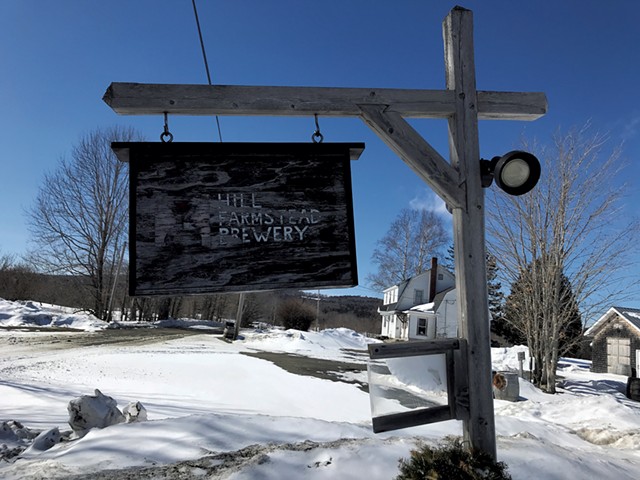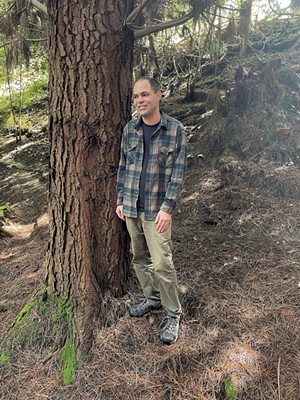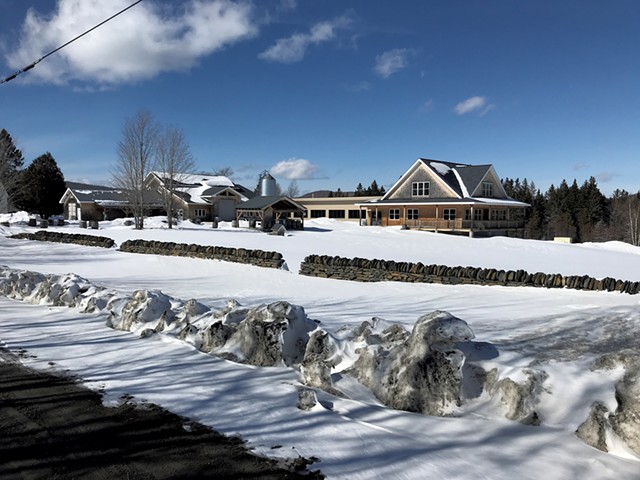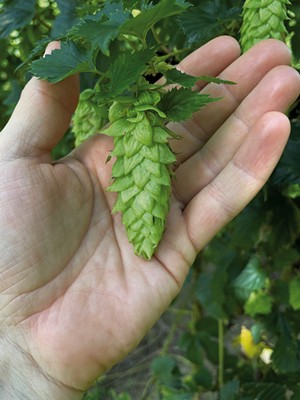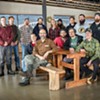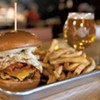Switch to the mobile version of this page.
Vermont's Independent Voice
- News
- Arts+Culture
- Home+Design
- Food
- Cannabis
- Music
- On Screen
- Events
- Jobs
- Obituaries
- Classifieds
- Personals
Browse News
Departments
Browse Arts + Culture
View All
local resources
Browse Food + Drink
View All
Browse Cannabis
View All
-
Culture

'Cannasations' Podcaster Kris Brown Aims to 'Humanize'…
-
True 802

A Burlington Cannabis Shop Plans to Host…
-
Business

Judge Tosses Burlington Cannabiz Owner's Lawsuit
-
Health + Fitness

Vermont's Cannabis Nurse Hotline Answers Health Questions…
-
Business

Waterbury Couple Buy Rare Vermont Cannabis License
Browse Music
View All
Browse On Screen
Browse Events
Browse Classifieds
Browse Personals
-

If you're looking for "I Spys," dating or LTRs, this is your scene.
View Profiles
Special Reports
Pubs+More
Society and Solitude: The World's Top Brewer, Vermonter Shaun Hill, Reconsiders his Business
Published March 23, 2021 at 2:54 p.m. | Updated March 24, 2021 at 10:07 a.m.
In February, Shaun Hill was in Christchurch, New Zealand, where he spent two weeks in "managed isolation." The mandatory quarantine, which he experienced across the world from his home in Vermont, offered Hill time to reflect.
Usually, he's brewing beer at Hill Farmstead Brewery in Greensboro, the brewery he founded in 2010 at the farm on Hill Road where he grew up. Rated the No. 1 brewer in the world for seven straight years and eight of the last nine, Hill Farmstead was a subject of Hill's reflection. (The ranking is by RateBeer, which most recently named Hill Farmstead the best brewer for 2020.)
Over a decade, Hill's beer has transformed people's appreciation of the beverage. His brewery has altered the pace and rhythm of life on Hill Road, particularly at 403, where Hill lives, brews and sells beer. With its "beer-flavored beer" that's made to be a pleasure to drink, as Hill describes it, and its beautiful, open setting, Hill Farmstead is a mecca for beer seekers.
A mecca and a pandemic are, by nature, at odds. In 2020, the year Hill Farmstead was to celebrate its 10th anniversary, Hill adapted his business for curbside pickup and limited home delivery. Early this year, he closed the brewery for a three-month break, during which he traveled to New Zealand.
In early March, after his time in isolation, Hill answered a set of questions from Seven Days, putting down in writing his thoughts and insights of the previous weeks.
Hill Farmstead will reopen for curbside service on April 7. In the email interview that follows, Hill, 41, writes about his family, his plans for 2021 and the state of beer.
SEVEN DAYS: When you started the brewery in 2010, Hill Road was a pretty empty place. That changed over the course of a decade, with people arriving from all over the country to buy your beer and see where it's made. Your 10-year anniversary coincided with a return to relative quiet and solitude on Hill Road. Can you talk about that trajectory and, in particular, what the unexpected lull in the action (due to COVID-19) has been like for you?
SHAUN HILL: Hill Road really was a quiet place 11 years ago. There was a magnetic and silent quality that was temporarily paused for a decade. A dilapidated white house and a few agricultural relics such as field stone walls, a former barn's cracked foundation, and hay fields. I created the brewery because I wanted to live in this place, on Hill Road, and connect with the natural world and its divine resonance. I projected that I would net $8,000 in my first year of business — and I saw this as a sufficient reward for bootstrapping an idealistic enterprise.
The creation of Hill Farmstead Brewery seemed to have coincided with the expanding tentacles (no offense meant toward invertebrates) of social media's mobile connectedness. Within a short period of time, I allowed the overwhelming and unpredictable crush of consumer demand to guide me toward expansion and compromise after subsequent compromise.
Pandemic was a reset. I had been working with business coaches for half a decade in an attempt to improve leadership skills and try to alter the business. What I hadn't realized, until just a few weeks ago, was that the business itself was my compromise. I was a divided self. Now, the pandemic has provided an alternative narrative to arise. A new pathway emerges.
SD: Why do you think Greensboro — founded by your ancestors — is and has been home to such interesting and creative people and their work? I'm thinking of you guys, Jasper Hill Farm, [novelist] Wallace Stegner, [gardener/writer] Lewis Hill. What's your understanding of the greatness in Greensboro?
SH: Perhaps Greensboro, like other places on the planet, is host to an energy vortex. It is an ongoing dialogue at the brewery with the staff — past and present. Things happen that no expert, no person, has ever experienced before and is typically unable to explain. Or ... perhaps there is a level of awareness, a stark contrast to "business as usual" in everyday life. In order to live in this place, one must be creative while also wanting to live an unconventional lifestyle. There is a certain type of adaptation to the isolation — a detachment from the normatives — that provides the space and opportunity to thrive.
SD: When you named a beer for your grandfather, Edward, were you thinking about his 13 siblings and imagining an ancestral line of names to build on?
SH: Definitely. This was a theme that was fully thought out in advance. I had worked at brewpubs and breweries that had no naming convention. The creation of new beers became a bit stressful because there were no boundaries or theme. I had generally found embarrassment in how some members of the beer industry approached the naming of its products in such a juvenile, often offensive manner (not uncommon back then to find beer names that were offensive to gender, race and sexuality).
In 2009, I began thinking about the various approaches that I could take for naming the beers. An extension of self, that spoke to my connection to the place and my experience.
The first beer brewed in the brewery (on March 30, 2010) was named after Edward (American Pale Ale), and the second batch was named after his father, Abner (Double IPA). It made sense to me then and it still does now. Each of these individuals is now a spirit committed to memory, a name (letters) listed in a genealogical record, and each inhabited the space that I now occupy.
SD: You're the eighth generation of your family to live and work in Greensboro — a history dating to the 1780s that people can read about on Hill Farmstead's website. Can you talk about your immediate family and their involvement in and contributions to the brewery?
SH: My brother and I are the eighth generation in Greensboro and seventh in North Greensboro, as we refer to it. I wish I could have a conversation with any one of those early-generation members. It is because of the emotional support and encouragement of my mother, father and brother that I was able to continue onward with conviction despite so many temporary setbacks over the years.
My parents always encouraged me to travel, to think big ideas, and I cannot recall ever being discouraged due to their lack of belief in me. In the early days, my dad washed kegs on Saturdays and Sundays, and my mom helped with customers in the retail shop (which was a 3-feet-by-3-feet square in the early days). Even today, most customers would recognize my mom from her summers working in the taproom — filling growlers and pouring glasses of beer.
My brother [Darren] was pivotal in the success and workload of those first five or six years. He was my first assistant brewer, really, and was there when I mashed in my first batch. He's a quick learner (and talented woodworker); the buildings and grounds all reflect his own dedication and sacrifice.
Over the years, they each assisted in any manner that they could — from tending to the brewery's wastewater, siding the building with such profound detail (dovetail cedar window trim with copper drip edge), planting flowers, building rock walls, helping on the package line ... unfathomable, really. Even today, my cousin Tom (Arthur's son) utilized our spent grain in his farm operations and also hays the fields.
SD: It's a sunny, summer day and you're drinking a pint of Edward. What do you like to eat with it? How about in front of the woodstove with a snowstorm outside? You're drinking an Arthur; what're you eating?
SH: I'm quite simple and typically like to just enjoy the beer all by itself. Never in direct sunlight, of course! Edward, Arthur and Damon are my three favorite beers. Each of these is nearest and dearest to my heart. If one is seeking a pairing of sorts, Jasper Hill cheese is a starting point. Edward + Harbison. Arthur + Winnimere. Snowstorm outside? Just a wood fire and a small glass of Damon (bourbon barrel-aged imperial stout).
SD: You make a beer called Civil Disobedience. Have you thought about its name in relation to the protests that happened last summer across the country, the call for racial justice? Does Civil Disobedience mean something new or different to you these days?
SH: Oh, of course. We released a beer named Civil Disobedience 2020. We donated 100 percent of the proceeds to the NAACP Legal Defense [and Education] Fund, the Innocence Project, [and the] Know Your Rights Camp.
The meaning of Civil Disobedience remains the same to me, and I keep with the belief that engaging in violence undermines the intention and greater messaging ability of protest. The beer name came directly from Thoreau's work — and remains one of my favorite short essays. I do believe that everyone should read this text prior to participating in any form of protest.
SD: Hill Farmstead had curbside pickup for most of the past year. When do you think the taproom will open on a regular basis? Are you considering changing your distribution method if things need to stay closed or are open with quarantine regulations in place for a while?
SH: I do not envision the taproom reopening in 2021. We will continue with the curbside model throughout the year. The curbside model has proven to be valuable in a manner beyond that of mere efficiency. We have seen the return of former customers and local community members that avoided us for the last eight-plus years because they didn't want to wait in line.
We have experimented (for the sake of learning) with both home delivery and direct-to-consumer models. We enjoy having our very small and focused team at the moment and want to continue working on self-cultivation prior to hiring taproom staff and altering production. I am exploring ways of creating a reservations system that will allow us to manage our traffic flow and create a more predictable experience for both ourselves and for our customers.
SD: Do you find that without people around (customers hanging out), you're thinking about beer differently and experimenting with new ideas and approaches? Or is it usually an internal (to the brewery) and independent endeavor?
SH: I find myself connecting more with the land. The birds. The trees. At some point in the last decade, each and any day that we were open could end up feeling like a festival with an unpredictable amount of traffic. I find myself exploring familiar territory: What do I value most? Have my priorities aligned with my values? How do I find realignment with my now-undivided self? I had set out to revive and diversify (and prolong) the memory of Hill Farmstead and came to realize that I have done nothing other than create yet another form of monoculture on Hill Road: brewery rather than dairy farm.
I have lost my connection with the farmscape, with my original intentions to find peace through my groundedness in my surroundings. The space provided by partial closure has allowed me to explore and embrace the principles of management and leadership, to question and rediscover both my values and my priorities, and to recognize and create a pathway that will (and must) align my formerly divided self (business and economy have a way of coaxing us to compromise) with a different approach to conducting business. The beer industry is in dire need of assessment and introspection.
SD: Not so long ago, beer was just beer — not the kind of prized and analyzed drink it's become in the last decade or so. What do you think of that phenomenon, and how do you see your place in it?
SH: Well, I think that to some extent beer can be prized and analyzed — but at the same time it is getting further away from itself.
On one side (perhaps the "negative" side), some brewers have gone beyond the beverage formerly known as "beer" to adding oddities such as hamburgers and French fries, Oreos, cereal brands and just about any other food product into their mash tun or fermenter. Brewers are now fermenting water and dextrose (100 percent GMO corn sugar), calling it seltzer, and falling under the umbrella license of beer manufacturing. There are collaborations that occur for nothing other than marketing. There are multinational consolidations. There is a wasteful and seemingly unending stream of single-use packaging and aluminum can excess.
Much of "beer" has succumbed to the capitalist ideal — to infinite boundless growth and the infinite postponement of plenty. Breweries have lost sight of themselves in a sea of wealth and success. The word "sustainable" is manipulated to suit economic interests and is therefore rendered meaningless.
On the other side, I think that Hill Farmstead and several other brewers have adhered to the obsessive pursuit of a goal (a sort of classic definition of beer and drinkability) that likely did alter the course of beer — ripples — and that many of us do love beer that is still beer. Beer-flavored beer. I see my own pursuit and learning as that of blending new-world with old-world traditions. I have wanted to elevate beer beyond silly and pun-focused naming conventions for two decades. I set out to create beer that possessed a formerly unexplored quality of mouthfeel and that was pleasant to drink. Simple.
I think that beer, like any intoxicant, is worthy of respect — and that much is lost through both economic exponentialism and a bit of consumer mocking. I believe that beer and fermented alcoholic beverages need to be revered and respected. Ours is a culture of addiction and codependencies, of virtually unconscious and instantaneous desire fulfillment, of confusion and a longing for joy.
If some of us can take a leap toward personal responsibility — toward healthier actions and grasping our individual planetary impact, I believe that we can foster a more hopeful environment and generate new ripples of progress and mutual respect. For some reason, an Oreo mocha poblano captain crunch pilsner conditioned on sushi rice and nori doesn't seem like the vehicle to get us there. But maybe I am too serious!
Related Locations
-
Hill Farmstead Brewery
- 403 Hill Rd., Greensboro Northeast Kingdom VT 05842
- 44.60670;-72.26340
-
 802-533-7450
802-533-7450
- www.hillfarmstead.com…
Related Stories
Got something to say?
Send a letter to the editor
and we'll publish your feedback in print!
Tags: Food + Drink Features, Shaun Hill, Greensboro, New Zealand, brewing, beer, Hill Farmstead Brewery
More By This Author
About The Author

Sally Pollak
Bio:
Sally Pollak is a staff writer at Seven Days. Her first newspaper job was compiling horse racing results at the Philadelphia Inquirer.
Sally Pollak is a staff writer at Seven Days. Her first newspaper job was compiling horse racing results at the Philadelphia Inquirer.
Speaking of...
-

Waterbury’s Craft Beer Cellar Gets a New Name — and a Bar
Feb 27, 2024 -

Vermont Communities Tackle Budgets, Bridges and Bonds on Town Meeting Day
Feb 21, 2024 -

Video Guide: Things to Do in Vermont During the Eclipse
Jan 25, 2024 -

Winooski’s Vermont Homebrew Supply to Close
Jan 16, 2024 -

Morrisville’s Lost Nation Brewing Charts a Path Through a Changing Beer Landscape
Jan 9, 2024 - More »
Comments
Comments are closed.
From 2014-2020, Seven Days allowed readers to comment on all stories posted on our website. While we've appreciated the suggestions and insights, right now Seven Days is prioritizing our core mission — producing high-quality, responsible local journalism — over moderating online debates between readers.
To criticize, correct or praise our reporting, please send us a letter to the editor or send us a tip. We’ll check it out and report the results.
Online comments may return when we have better tech tools for managing them. Thanks for reading.
- 1. La Montañuela and D’Aversa Furniture to Open Wine Bar-Showroom in Vergennes Food News
- 2. Three Questions for Kate Blofson of Jericho’s Born to Swarm Apiaries Agriculture
- 3. New Sheep Shop Café on a South Woodbury Homestead Gathers the Herd Food + Drink Features
- 4. The Café HOT. in Burlington Adds Late-Night Menu Food News
- 5. After 33 Years, Cheese & Wine Traders in South Burlington Shutters Abruptly Food News
- 6. Pauline's Café Closes in South Burlington After Almost Half a Century Food News
- 7. Montréal's Jewish Eateries Serve Classics From Around the World Québec Guide
- 1. Montréal's Jewish Eateries Serve Classics From Around the World Québec Guide
- 2. Pauline's Café Closes in South Burlington After Almost Half a Century Food News
- 3. After 33 Years, Cheese & Wine Traders in South Burlington Shutters Abruptly Food News
- 4. Jacob Holzberg-Pill Helps Cultivate Vermont’s Growing Appetite for Edible Landscaping Agriculture
- 5. Small Pleasures: Monument Farms Dairy’s Chocolate Milk Inspires Devotion Small Pleasures
- 6. Ondis Serves Seasonal Fare With a Side of Community in Montpelier Food + Drink Features
- 7. New Sheep Shop Café on a South Woodbury Homestead Gathers the Herd Food + Drink Features





























